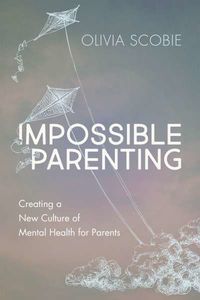Exhausted by the Parenting Wars? Read an Excerpt from Olivia Scobie's Brilliant Book, Impossible Parenting
At some point, amidst a rising tide of parenting blogs, personal essays, and, eventually, Instagram posts, good parenting shifted from something you do to something you are. If you aren't transcendentally fulfilled by every single aspect of parenting – no matter how mundane, exhausting, or frankly difficult – you are suddenly suspect. Every school lunch should be Louvre-worthy, every pumpkin patch outing should involve coordinated outfits purchased from local artisans, every walk to the park should be filled with educational opportunities and, most importantly of all, heavily documented.
But maybe there's a way to lessen pressure on parents. Olivia Scobie is hoping to do just that with her new book, Impossible Parenting: Creating a New Culture of Mental Health for Parents (Dundurn Press), where she proposes that by letting go of unrealistic contemporary standards of parenting from the get-go, parents can have their own mental health supported, improving life for all family members. The shift in thinking from child-centred to family-centred means a way to parent without annihilating the self, while still doing everything you can for your kids with the resources you have. It's parenting without guilt and it might just be possible.
We're excited to bring an excerpt from Scobie's book to you here today. Wry, empathetic, informed, and logical, Scobie's writings are a must-read for every burnt-out parent or curious parent-to-be.
Excerpt from Impossible Parenting: Creating a New Culture of Mental Health for Parents by Olivia Scobie
Parents are well aware of the problematic nature of today’s parenting culture, and they’re usually able to identify the overwhelming messages as contradictory and ridiculous. We poke fun at “good parenting” ideals and the judgment and competition that comes with them. The popularity of movies and shows such as Bad Moms, Workin’ Moms, or The Letdown, and websites like Scary Mommy, suggests that we understand that we’re overdoing it. We can laugh about our fixation with developmental milestones and our competitiveness around things like lunch-box art. Unfortunately, while mocking it might be easy, letting go of the internal expectations to be a perfect parent is a much greater challenge. A 2014 study about the impact of intensive-mothering messages found that while parents can see the inherent problems of setting this gold standard of good parenting, we are actually working harder than ever before to try to achieve it. Parents I work with often express this contradictory feeling of “I know better but I can’t seem to do better or feel better.”
The rules of parenting are moving targets, and since I first became a mother fifteen years ago, I’ve watched intensive-mothering expectations morph and become even more impossible to achieve. While the goal of a “happy, healthy, and successful” outcome for children is not unique to our era, the number of resources required to achieve it is unprecedented and parents’ efforts toward it are more highly scrutinized than ever. Parents in the 1980s might have felt pressure to make sure their children were eating enough vegetables, but now we’re expected to give children a comprehensive diet of organic food that’s cooked at home, and ideally gluten- and sugar-free as well. We still look to parenting experts, but the amount of information available to us is contradictory and always changing, making it hard for us to know what to trust. And with the rise of the internet and social media, the intimate details of our lives are now witnessed publicly in a way they never were before.
Western parenting culture is now dominated by a parenting philosophy that I call impossible parenting. Impossible parenting is rooted in the core concepts of intensive mothering that demand child-centred families, research-based decisions, and continuous responsiveness. But now that is no longer enough, and parents are also expected to obsess over health and risk aversion, hyperfocus their attention on psychological outcomes, and ensure everyone experiences gratitude and joy along the way. And all of it must be demonstrated on social media, because in many ways parenting has become a lifestyle brand that aligns with whatever community subculture you want to belong to, such as attachment parents, free-range parents, tiger parents, or feminist parents. While each community interprets impossible-parenting standards slightly differently, there are six core values that underpin this new culture.
VALUE ONE: THE MORE YOU SACRIFICE, THE MORE YOU LOVE
Sacrifice has long been connected to the concept of parenting, and there is a certain amount of personal sacrifice involved. How we spend our time, energy, and financial resources changes dramatically when we have children, particularly in the early years. This is normal. But when groups of parents get together, a competitive edge sometimes creeps into the conversation about how much we have suffered. While I think this is because we want so badly to have our sacrifice acknowledged and validated, it can often show up as a race to the bottom: who’s the most tired, who had the worst recovery from birth, who had to soothe a screaming baby for the longest. A close friend of mine who had a relatively smooth birth, whose baby took to nursing easily and was a pretty good sleeper right from the beginning, said that she was reluctant to share her experience with other parents because she felt like it would upset them. She felt as though her contributions about her struggles with parenting were dismissed because in some ways she was suffering less than them.
I experienced a stark example of this myself when I participated in an invasive medical study when my children were very young and I was very poor. My family celebrates Christmas and that year I didn’t have enough money to buy the children presents, so when I learned that this study paid $400, I jumped at the opportunity and considered myself lucky to be selected. It involved several steps, but the big day involved lying in a CT scanner with an arterial line into my left wrist so that they could easily draw blood every thirty minutes while I was in the machine. My head was strapped down using a mesh mask, and the research attend- ant stretched two small holes for my mouth and nose before the mask hardened to lock my head into place. As they slid me into the bore of the machine, which felt like a teeny tiny space, it triggered a claustrophobic response and I started to panic. I should have quit right then, but I was so desperate for the money that I silently suffered through a two-hour- long panic attack. I tried desperately to stop my body from shaking, and I wasn’t sure what to do with the tears flowing into my ears and my nose, because the mask was so tight they had nowhere to escape. I was so traumatized that when it was all over I couldn’t regulate my heart rate. The staff was worried about letting me leave because of the wound from the arterial blood draw; they threatened to stitch it shut surgically if I didn’t calm down. Overall it was an awful experience, and it left me without the use of my wrist for almost a week because I was afraid that if I moved it, I would bleed out (I wouldn’t have). When I started to tell people what had happened in the days that followed, I wasn’t met with outrage, or support for how I’d felt the need to endure this traumatizing procedure. Instead I was met with praise — so much praise — about what a good mother I was to give my children the beautiful Christmas they deserved.
Unfortunately, we do receive subtle (and not-so-subtle) messages that reinforce the idea that the more we sacrifice, the more we demonstrate our love for our children. This is obviously a false connection, and it can lead us to put our physical and mental health in jeopardy. Normalizing parental suffering as an act of love prevents people from getting the mental health support that they need. Telling people that they’re better parents if they suffer more can artificially boost their parenting confidence, creating a sick cycle of rewards for (often unnecessary) sacrifice. This sacrifice/love cycle emphasizes the message that good families are child-centred, as opposed to a family-centred philosophy where every family member’s needs matter equally.
Your CanLit News
Subscribe to Open Book’s newsletter to get local book events, literary content, writing tips, and more in your inbox
___________________________________________________
Excerpted from Impossible Parenting by Olivia Scobie © 2021 Olivia Scobie. All rights reserved. Published by Dundurn Press (dundurn.com).
Olivia Scobie is a social work counsellor and educator who specializes in perinatal mood, birth trauma, and parental mental health. She lives in Toronto.





